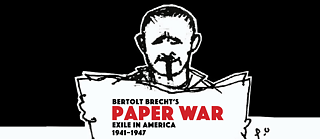02/10-03/17/22
Bertolt Brecht's Paper War
Exhibition
-
Goethe-Institut New York, New York, NY
- Language English
- Price Free
- Part of series: Bertolt Brecht's Paper War

Between 1941 and 1947, writer Bertolt Brecht lived in exile in the United States. As a European refugee during World War II and, despite his fame and reputation as a playwright, an outsider in Hollywood and Broadway, this period in Brecht's life was characterized by astonishment and alienation.
How do you make sense of a strange country during an ever-changing era? Brecht turned to newspapers and other American media to make sense of American culture and his world of exile. In his projects "War Primer" and "Journal," he wrote about the political climate, literature, and theater, borrowing articles, photos, and headlines to create montages in his writing and reflection.
Eighty years after his exile in the U.S. began, Bertolt Brecht's Paper War looks through Brecht's glasses with contemporary eyes, reflecting on his views of the American way of life during the time of Roosevelt, Truman, and McCarthy, combining Brecht's writing and the newspaper clippings he used for inspiration. By combining these elements in an exhibition, curator Grischa Meyer pays homage to Brecht's montage format, expanding and renewing the aesthetic point of view while adding contemporary context and understanding to the works.
The exhibition is supported by the Rosa-Luxemburg-Foundation/New York Office, with funding from the German Foreign Office (Auswärtiges Amt), and is accompanied by talks and film screenings. A version in German will be simultaneously presented at the Augsburg Brecht Festival 2022.
Grischa Meyer is a graphic designer, author, and lecturer, born in Berlin/GDR. He has published works on the photographer and theater actress Ruth Berlau, on war photography, and German post-war everyday history. He has been researching Bertolt Brecht’s text-image montages since 2005, the first interim results of which are on display in this exhibition, in collaboration with Holger Teschke, a Berlin-based dramaturge, writer, and lecturer.
How do you make sense of a strange country during an ever-changing era? Brecht turned to newspapers and other American media to make sense of American culture and his world of exile. In his projects "War Primer" and "Journal," he wrote about the political climate, literature, and theater, borrowing articles, photos, and headlines to create montages in his writing and reflection.
Eighty years after his exile in the U.S. began, Bertolt Brecht's Paper War looks through Brecht's glasses with contemporary eyes, reflecting on his views of the American way of life during the time of Roosevelt, Truman, and McCarthy, combining Brecht's writing and the newspaper clippings he used for inspiration. By combining these elements in an exhibition, curator Grischa Meyer pays homage to Brecht's montage format, expanding and renewing the aesthetic point of view while adding contemporary context and understanding to the works.
The exhibition is supported by the Rosa-Luxemburg-Foundation/New York Office, with funding from the German Foreign Office (Auswärtiges Amt), and is accompanied by talks and film screenings. A version in German will be simultaneously presented at the Augsburg Brecht Festival 2022.
Grischa Meyer is a graphic designer, author, and lecturer, born in Berlin/GDR. He has published works on the photographer and theater actress Ruth Berlau, on war photography, and German post-war everyday history. He has been researching Bertolt Brecht’s text-image montages since 2005, the first interim results of which are on display in this exhibition, in collaboration with Holger Teschke, a Berlin-based dramaturge, writer, and lecturer.
Related links
Location
Goethe-Institut New York
30 Irving Place
New York, NY 10003
USA
30 Irving Place
New York, NY 10003
USA